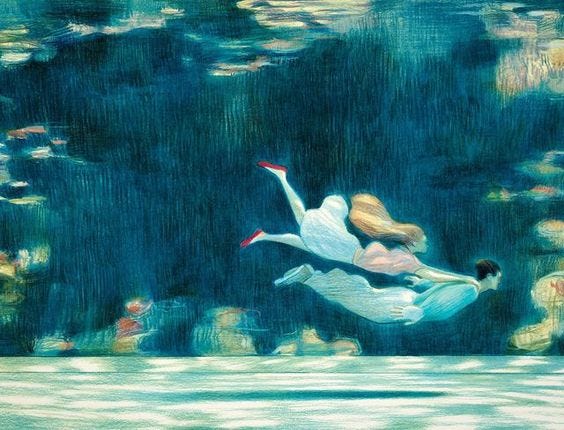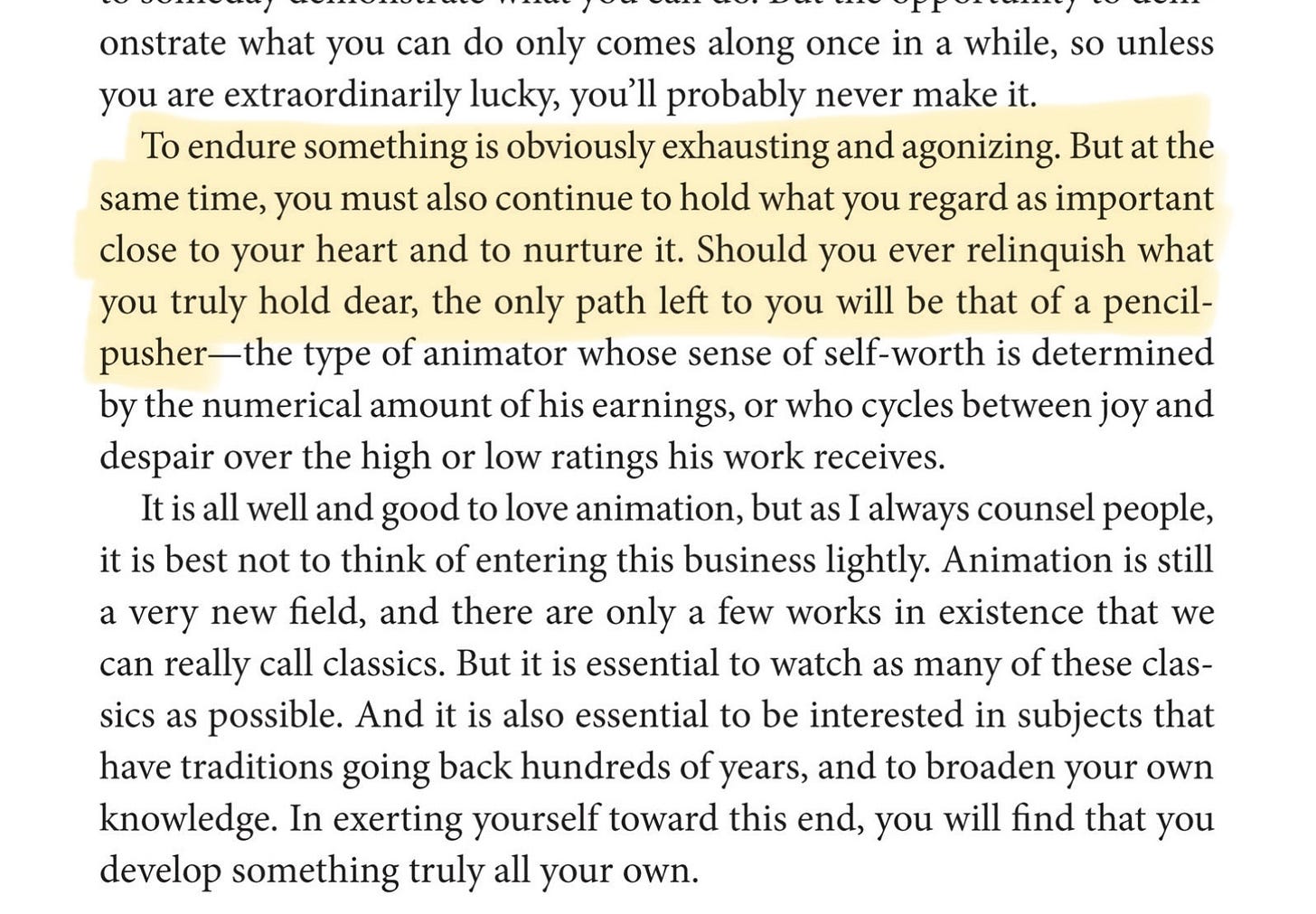what's a good commitment?
The Muse of Realization returns again and again to say "It is yet more difficult than you thought."
In my grandparents’ time, it was believed that spirits existed everywhere...in trees, rivers, insects, wells, anything... I like the idea that we should all treasure everything because spirits might exist there, and we should treasure everything because there is a kind of life to everything." Hayao Miyazaki
I’ve been reading Starting Point, a collection of Miyazaki’s essays, interviews and theories of animation from the first few two decades of his career (1979-1996). I like that he marks the first two decades as his ‘starting point’ — 20 years of progress as a mere drop in the cup toward magnum opus, or mastery. He later wrote an apt second volume named Turning Point, for the following 20 years of his career in global animation.
Miyazaki writes about tenacity and commitment throughout the book. One must continuously choose art or craft through cycles of disenchantment and drudgery if one wishes to progress in any meaningful way. To endure something is obviously exhausting and agonizing. But at the same time, you must continue to hold what you regard as important close to your heart and nurture it. should you ever relinquish what you truly hold dear, the only path left to you will be that of a pencil pusher.
It reminds me of when Wendell Berry wrote: there are two muses — the Muse of Inspiration, who gives us inarticulate visions and desires, and the Muse of Realization, who returns again and again to say "It is yet more difficult than you thought."
Naively, I keep finding that things are more difficult than I assume they will be. Maybe that’s just my own faulty perception. Or perhaps that’s the glory or burden of the human condition: choosing things knowing they will be hard. Treading the fine line between cynicism and euphoria.
On our run I tell J: the unhealthy version of myself used to abandon things just because they got painful or inconvenient. The healthy part of me finds joyfulness in persisting in something for a very long time. In hindsight it sounds really obvious but it genuinely eluded me for a really long time: the mark of overall healthiness in spirit is being able and willing to make healthy commitments. Knowing instinctually what to commit to and what to let go of.
In that vein, it’s important to reflect on what makes a good commitment for you. For me that’s asking myself: Can I come back to this regularly? Does it give me energy? Do I care enough to fix it when everything breaks? That’s a hard lesson to learn: growth breaks everything.
In Bushra’s piece on decluttering as applied reasoning, she posits that we can be more agentic by assessing our relationship to objects and ideas we’re holding on to - hence, decluttering of mind and spirit. Of the many questions she poses to the reader on figuring out what feeling a prior commitment evokes, I reflect on this one the most: Can I take care of it? If so, do I enjoy taking care of it?
My recurring thought these days is, when you get it right commitment feels like a great deepening: of love, knowledge, and wonder. The aperture of life widens, letting more light in.
*
The world continues to be one glorious pool of endless optionality, infinite choice. Multiple places to be in one night. Hobbies to pick up. People to meet. That’s comforting but scary because it means you have to choose, a la Sylvia Plath’s fig tree. The anxiety of having infinite possibilities branch out before you. You think you’ll suffer if you continue down one trail and neglect all other pathways. The truth is: you’ll probably suffer more if you don’t choose at all.
One might extrapolate this to relationships. Many of my friends in New York tell me dating is excruciating and lonely because everyone subconsciously thinks they can optimize for the perfect person by keeping their options open forever. Perhaps it’s commitments to self. We rarely articulate: I’ll stick with X because I chose it, and that means sacrificing something else to make room.
This has parallels to choices in the professional realm too: pick the path and pursue it wholeheartedly. Pick the channel and keep flowing energy through the pipes. Move toward complexity and the hard problem. Make the solution elegant and robust. The conversation I listened to at Stripe Sessions between Patrick Collison (CEO of Stripe) and Jensen Huang (CEO of Nvidia) perfectly exemplifies this idea of commitment to craft as it relates to tech products —
Paraphrasing my notes:
J: You can’t make extraordinary things through just operational excellence. It takes ‘loving care’ but that’s not something you can put in an email, or product specification. I use love and care abundantly when I think about great technological products. In fact you need to use those words: craft and beauty.
P: There’s a particular ineffable character to it that doesn’t serve any customer need directly. You don’t have the words to describe it, but experientially it’s felt.”
*
Earlier this year I felt a little manic and anxious. I can do everything! What do I do? More recently my mind is quiet and clear. I can only do a few things. What do I choose?
The point of striving is to recognize we are gifted with agency and possibility. We can create, or destroy. Mend or break. Give up the fight or eke it out. We devote ourselves to something or other, and it is our choice what form and shape that worship takes.
I find myself again at a starting point, or maybe my whole life has been the starting point. I come to this new clearing, or, periphery, feeling this deep sense of stillness and a kernel of hope encapsulated gently within the stillness.
Nothing exists by accident. Nothing that truly lasts is built out of halfheartedness. Instead, it’s about committing to your particular vision of what you wish to send out, like a messenger vessel, into the foreign and shapeshifting world. With hope, velocity, a good dose of fear. Purposeful tenacity is what makes the world function. It’s what imbues everything with both utility and beauty. Focus is what makes commitment possible, and the best commitments make you feel more alive.
PS: Thank you for reading - if you feel inclined; please like, share and subscribe. Your support helps me curate more posts and reach more readers!
What I’m Reading
Bushra on decluttering as applied reasoning
The process of decluttering isn’t about simplistically letting go, but really thinking through the ingress and egress of everyday things through the filters of your emotions, reasons, and beliefs.
If you discard, cancel, create thoughtful knobs or boundaries between the many available and abundant flows, or donate without considering the why, how x came to be in your life, tracing the causal chain—you’ll keep recreating your patterns of reasoning that’s expressed as clutter and overwhelm.
But if you see the why and how, the whole fabric of reasoning of why it made sense to you at that time to purchase X or keep X, what it was addressing, and why it doesn’t make sense anymore, you might still repeat patterns of your reasoning—but at least you’ll be far more conscious of it, catch yourself slipping into habitual ways of relating to yourself and your environment, and create better ways to titrate and filter decisions.
The more I do it, the more I think is a particularly bespoke and humane form of reasoning towards your well-being.
Quotes of the Week
“I think there are two types of writers, the architects and the gardeners. The architects plan everything ahead of time, like an architect building a house. They know how many rooms are going to be in the house, what kind of roof they’re going to have, where the wires are going to run, what kind of plumbing there’s going to be. They have the whole thing designed and blueprinted out before they even nail the first board up. The gardeners dig a hole, drop in a seed and water it. They kind of know what seed it is, they know if planted a fantasy seed or mystery seed or whatever. But as the plant comes up and they water it, they don’t know how many branches it’s going to have, they find out as it grows. And I’m much more a gardener than an architect.” - G.R.R. Martin via Are.na (@Liv Pasquarelli)
I relate to being far more of a gardener than an architect.
To be born means being compelled to choose an era, a place, a life. To exist here, now, means to lost the possibility of being countless other potential selves.. Yet once being born there is no turning back. And I think that's exactly why the fantasy worlds of cartoon movies so strongly represent our hopes and yearnings. They illustrate a world of lost possibilities for us. — Miyazaki from Starting Point
Reads and Highlights
Beware of Pity by Steven Zweig
I know you have only weakened out of pity — one of the best possible motives. But — and I think I’ve already warned you on this score — pity is a confoundedly two-edged business. Anyone who doesn’t know how to deal with it should keep his hands, and above all, his heart, off it.
South and West by Joan Didion which is very underrated compared to her other collections
I had only some dim and unformed sense, a sense which struck me now and then, and which I could not explain coherently, that for some years the South and particularly the Gulf Coast had been for America what people were still saying California was, and what California seemed to me not to be: the future, the secret source of malevolent and benevolent energy, the psychic center.
Solenoid
The line of our life only solidifies behind us, it becomes coherent as it fossilizes into the simplicity of destiny, while the lives that could have been, that could have diverged, moment by moment, from the life that triumphed, are dotted, ghostly lines: creodes, quantum differences, translucid and fascinating like stems vegetating in the greenhouse. If I blink, my life forks: I could have not blinked, and then I would have been far different from the one who did, like streets that radiate out from a narrow piaţa. In the end, I will be wrapped in a cocoon made of the transparent threads of millions of virtual lives, of billions of paths I could have taken, each infinitesimally changing the angle of approach.






love this 🫶 to piggyback on your 'declutter' analogy: you train your own agency and decision making process every time you sort out your possessions [when done thoughtfully as you described it of course]. which is another reason i'd always prefer to do it alone at first. i need this 'muscle' to be in shape. then i can invite and enjoy this with others.
👏